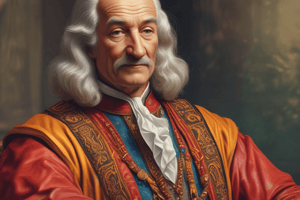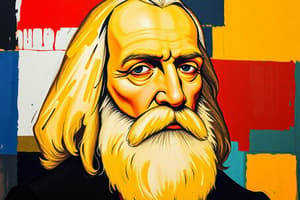Podcast
Questions and Answers
What is the main argument of Thomas Hobbes' seminal work, 'Leviathan'?
What is the main argument of Thomas Hobbes' seminal work, 'Leviathan'?
- To analyze the effects of capitalism
- To argue for a social contract and an absolute sovereign (correct)
- To guarantee fundamental freedoms and rights to citizens
- To advocate for a classless society
Which of the following is NOT a work written by Karl Marx?
Which of the following is NOT a work written by Karl Marx?
- The Communist Manifesto
- Leviathan (correct)
- Das Kapital
- The Wealth of Nations (correct)
What is the main purpose of the Court of Appeals (Highest)?
What is the main purpose of the Court of Appeals (Highest)?
- To review decisions of lower courts and uphold, reverse, or modify them (correct)
- To analyze the effects of capitalism
- To guarantee fundamental freedoms and rights to citizens
- To advocate for a classless society
What is the Canadian Charter of Rights and Freedoms?
What is the Canadian Charter of Rights and Freedoms?
What is the definition of a right?
What is the definition of a right?
Which of the following philosophers is known for his work on political philosophy and argued for a social contract and an absolute sovereign?
Which of the following philosophers is known for his work on political philosophy and argued for a social contract and an absolute sovereign?
What is the main idea of Marxist Theory?
What is the main idea of Marxist Theory?
Which of the following is a characteristic of the natural state of mankind according to Thomas Hobbes?
Which of the following is a characteristic of the natural state of mankind according to Thomas Hobbes?
What is the term for the physical act of committing a crime?
What is the term for the physical act of committing a crime?
Which of the following is an example of prejudice?
Which of the following is an example of prejudice?
What is the term for the right to articulate one's opinions and ideas without fear of government retaliation or censorship?
What is the term for the right to articulate one's opinions and ideas without fear of government retaliation or censorship?
What is the term for materials that discuss, interpret, and analyze primary sources of law?
What is the term for materials that discuss, interpret, and analyze primary sources of law?
What is an example of stereotyping?
What is an example of stereotyping?
What is the term for the right to vote in elections?
What is the term for the right to vote in elections?
What is an example of a hybrid offence?
What is an example of a hybrid offence?
What is the term for temporary release of an accused person awaiting trial?
What is the term for temporary release of an accused person awaiting trial?
Flashcards
Thomas Hobbes's view on the natural state
Thomas Hobbes's view on the natural state
Without government, life is harsh and short (solitary, poor, nasty, brutish, and short).
Social Contract Theory
Social Contract Theory
An agreement between people and their government where people give up some rights for protection and order.
Karl Marx's key idea
Karl Marx's key idea
Class struggle is the driving force of history, ultimately leading to a classless society.
Marxist Theory
Marxist Theory
Signup and view all the flashcards
Court of Appeals
Court of Appeals
Signup and view all the flashcards
Canadian Charter of Rights and Freedoms
Canadian Charter of Rights and Freedoms
Signup and view all the flashcards
Right
Right
Signup and view all the flashcards
Freedom of Expression
Freedom of Expression
Signup and view all the flashcards
Stereotyping
Stereotyping
Signup and view all the flashcards
Actus Reus
Actus Reus
Signup and view all the flashcards
Mens Rea
Mens Rea
Signup and view all the flashcards
Secondary Source
Secondary Source
Signup and view all the flashcards
Bail
Bail
Signup and view all the flashcards
Hybrid Offence
Hybrid Offence
Signup and view all the flashcards
Study Notes
Philosophers
- Thomas Hobbes: An English philosopher (1588-1679) who argued for a social contract and an absolute sovereign in his work "Leviathan" to avoid chaos and violence in the natural state of mankind.
- He believed that in the absence of political order and law, human life would be "solitary, poor, nasty, brutish, and short."
- Karl Marx: A German philosopher, economist, historian, sociologist, political theorist, journalist, and socialist revolutionary (1818-1883) who is known for his theories about capitalism and communism.
Marxist Theory
- A socio-economic theory that centers on the role of class struggle in societal development and advocates for a society without classes or state.
- The theory posits that capitalism, through its inherent inequalities, would lead to its own destruction and be replaced by socialism and eventually communism.
Legal Systems
- Court of Appeals (Highest): The highest appellate court in a jurisdiction, which reviews decisions of lower courts and can uphold, reverse, or modify those decisions.
- In the United States, the Supreme Court serves as the highest Court of Appeals.
- Canadian Charter of Rights and Freedoms (History): A bill of rights entrenched in the Constitution of Canada, enacted in 1982, that guarantees fundamental freedoms and rights to Canadians.
- The Charter includes freedoms such as freedom of expression, right to equality, and right to life, liberty, and security of the person.
Rights and Freedoms
- Right: A moral or legal entitlement to have or do something.
- Example: The right to vote in elections is a fundamental democratic right.
- Freedom: The power or right to act, speak, or think without hindrance or restraint.
- Example: Freedom of speech allows individuals to express themselves without censorship.
Social Concepts
- Stereotyping: Generalized beliefs about a particular group of people.
- Prejudice: Preconceived opinion not based on reason or experience.
- Discrimination: Unfair treatment of people based on their membership in a particular group.
- Example: Assuming all elderly people are bad drivers (stereotyping), feeling distrust towards a person from another ethnicity (prejudice), refusing to hire someone based on their gender (discrimination).
Law
- Secondary Source of Law: Materials that discuss, interpret, and analyze primary sources of law (statutes, regulations, and case law).
- Example: Legal textbooks, law review articles, and commentaries are secondary sources of law.
- Actus Reus: The physical act of committing a crime.
- Mens Rea: The mental intent to commit a crime.
- Example: In a theft case, actus reus would be the taking of property, and mens rea would be the intent to permanently deprive the owner of it.
- Freedom of Expression: The right to articulate one's opinions and ideas without fear of government retaliation or censorship.
- Example: Protesting government policies peacefully in public.
- Hybrid Offence: An offence under Canadian criminal law that can be prosecuted either as an indictable offence or a summary offence.
- Example: Assault can be prosecuted as either a summary offence or an indictable offence, depending on the circumstances.
- Bail: Temporary release of an accused person awaiting trial, sometimes on the condition that a sum of money be lodged.
Studying That Suits You
Use AI to generate personalized quizzes and flashcards to suit your learning preferences.



